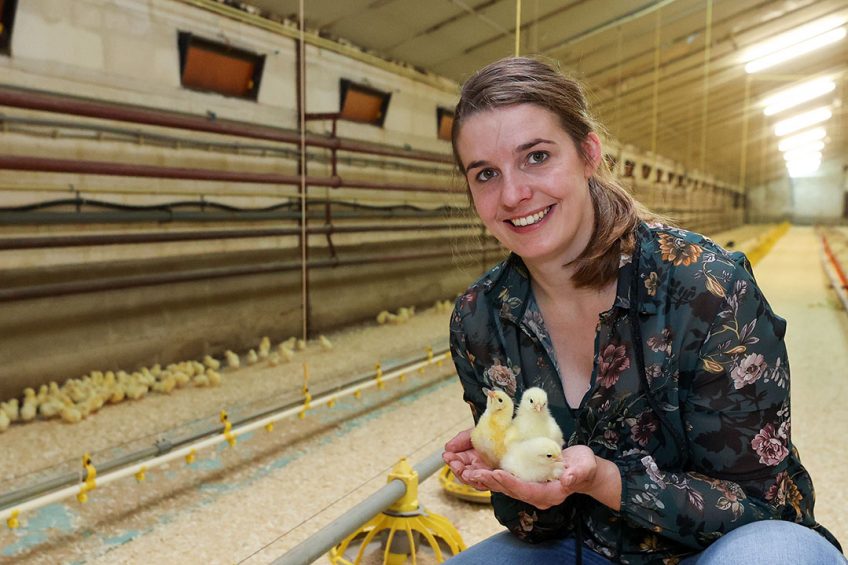Slower growing broilers are healthier

Researchers claim a significant commercial farm trial has shown that slower growing broilers are not only healthier but have a substantially higher welfare.
The research follows the publication of a study from FAI Farms, the University of Bristol and the Norwegian University of Life Sciences, which looked at a comprehensive suite of positive and negative welfare indicators in 4 production systems, varying in stocking density and breed. One slower growing breed was stocked at a planned maximum density of 30kg/square metre; a second slower growing breed at 30 and 34kg/square metre and the welfare outcomes were compared to those of a standard fast-growing breed stocked at 34kg/square metre.
Slowest growing breed slightly better welfare
At the lower density, the slowest growing breed was found to have slightly better welfare than the other slower growing breeds – indicated through lower mortality, fewer rejections at processing and better walking ability. Differences in welfare of the slower growing breed stocked at 2 densities were small.
…play was hardly ever mentioned in studies of chickens. We found that, when you walk through a commercial flock, you just have to turn around and look behind you to see chickens frolicking in your footsteps. This was especially the case in slower growing flocks.”
However, prominent differences were found between the standard fast-growing birds stocked at 34kg/square metre and birds in the 3 other systems. The standard birds experienced poorer health as indicated by higher levels of mortality, hock burn and pododermatitis as well as greater rejections at processing. The conventional birds showed less perching on enrichment bales as well as fewer positive play and exploration behaviours.
Lower density is good but slower growing is better
The study follows hard on the heels of the publication of a 2 year North American study at the University of Guelph, which showed broiler breeds with faster growth rates had lower activity levels, poorer indicators of mobility, poorer foot and hock health, higher biochemical markers of muscle damage and potentially inadequate organ development.
 Fast growth and high breast yield linked to poor welfare
Fast growth and high breast yield linked to poor welfare
Bird welfare is compromised when broilers are grown faster for higher breast meat yields
The authors of the latest study, published in Scientific Reports, said that while there are benefits of providing birds with more space, by slightly reducing animal density, changing to a slower growing breed resulted in much better health and more positive experiences for the broilers.
Professor Ruth Newberry and Dr Judit Vas at the Norwegian University of Life Sciences stressed the importance of taking into account positive experiences in animal welfare studies: “Until recently, play was hardly ever mentioned in studies of chickens. We found that, when you walk through a commercial flock, you just have to turn around and look behind you to see chickens frolicking in your footsteps. This was especially the case in slower growing flocks.”
 Evaluation of meat from slow-growing broilers
Evaluation of meat from slow-growing broilers
It is believed that by growing chickens in a semi-intensive system and giving them more time to attain maturity, muscle abnormalities in slower growing chickens might be reduced.
Robust evidence of health & welfare benefits of slower growing breeds
Dr Sioban Mullan, Senior Research Fellow in Animal Welfare at the Bristol Veterinary School, said: “This first independent commercial scale trial provides robust evidence of the health and welfare benefits of slower growing breeds of chicken. We hope it will help drive changes in supply chains and large companies to bring about real improvements to chicken welfare.”
Displaying positive behaviours improves an animal’s quality of life.”
Anne Rayner, FAI’s lead researcher, added: “Broilers are motivated to perform a range of positive behaviours. These positive behaviours create positive experiences, resulting in enjoyment or pleasure. Displaying positive behaviours improves an animal’s quality of life. Our seminal study found slow growing birds to have better health and perform more positive behaviours than conventional fast growing broilers. A shift away from fast-growing breeds would provide the most significant improvements for the lives of the 142 million chickens produced in Europe every week.”
The NGO backed European Chicken Commitment has attracted widespread attention from commercial broiler production with several major brands already having signed up, including KFC, Nestle, Nando’s and Marks and Spencer.












